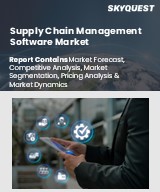
Report ID: SQMIG45A2353

Report ID:
SQMIG45A2353 |
Region:
Global |
Published Date: November, 2024
Pages:
182
|
Tables:
87 |
Figures:
76
Drivers
Cloud Supply Chain Management Increasingly being Adopted by SMEs
Tendency towards Technological Advancement and Investment that will Drive Market Growth
Restraints
Growing Security and Privacy Concerns in Corporations
Limited Knowledge of Supply Chain Management Tools
Our industry expert will work with you to provide you with customized data in a short amount of time.
REQUEST FREE CUSTOMIZATIONWant to customize this report? This report can be personalized according to your needs. Our analysts and industry experts will work directly with you to understand your requirements and provide you with customized data in a short amount of time. We offer $1000 worth of FREE customization at the time of purchase.

Report ID: SQMIG45A2353